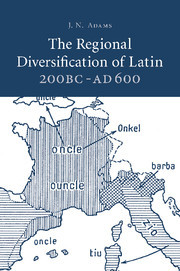Description
The Regional Diversification of Latin 200 BC - AD 600
Author: Adams J. N.
This book, first published in 2007, is a comprehensive examination of regional diversification in Latin from the earliest beginnings to late antiquity.
Language: English
Subject for The Regional Diversification of Latin 200 BC - AD 600:
Approximative price 49.66 €
In Print (Delivery period: 14 days).
Add to cart
The Regional Diversification of Latin 200 BC - AD 600
Publication date: 10-2014
Support: Print on demand
Publication date: 10-2014
Support: Print on demand
Approximative price 212.27 €
Subject to availability at the publisher.
Add to cart
The regional diversification of latin, 200 BC -AD 600
Publication date: 12-2007
850 p. · 16x23.5 cm · Hardback
Publication date: 12-2007
850 p. · 16x23.5 cm · Hardback
Description
/li>Contents
/li>Biography
/li>
Classical Latin appears to be without regional dialects, yet Latin evolved in little more than a millennium into a variety of different languages (the Romance languages: Italian, French, Spanish, Portuguese etc.). Was regional diversity apparent from the earliest times, obscured perhaps by the standardisation of writing, or did some catastrophic event in late antiquity cause the language to vary? These questions have long intrigued Latinists and Romance philologists, struck by the apparent uniformity of Latin alongside the variety of Romance. This book, first published in 2007, establishes that Latin was never geographically uniform. The changing patterns of diversity and the determinants of variation are examined from the time of the early inscriptions of Italy, through to late antiquity and the beginnings of the Romance dialects in the western Roman provinces. This is the most comprehensive treatment ever undertaken of the regional diversification of Latin throughout its history in the Roman period.
Part I. Introduction; Part II. The Republic; Part III. Explicit Evidence for Regional Variation; Part IV. Explicit Evidence; Part V. Regionalisms in Provincial Texts; Part VI. Spain; Part VII. Italy; Part VIII. Africa; Part IX. Britain; Part X. Inscriptions; Part XI. Conclusions.
J. N. Adams is a Senior Research Fellow at All Souls College, University of Oxford.
© 2024 LAVOISIER S.A.S.




